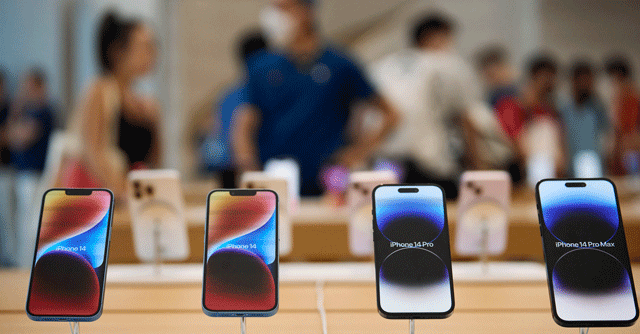
iPhone sales expected to reach record highs in India in 2022


After starting India production of the iPhone 14 several months ahead of usual schedules, Apple is expected to set another precedent by surpassing last year’s iPhone shipments in India this year. The company hit a record high for India last year with its iPhones, analysts expect the company to surpass those numbers this year on the back of strong sales of older devices.
“iPhones should see some growth in 2022 over last year. In 2021, iPhone shipments were around 4.8 million. This year, we are expecting it to be around 5.5 to 6 million,” said
Navkendar Singh, associate vice president, devices research, IDC India, South Asia, and ANZ. Singh noted that 2021 was a massive jump over 2020 as well.

According to Counterpoint Research, 2021 was the best year for Apple in India so far as it shipped 5.4 to 6 million units, its highest ever. It accounted for 70% of the market share in the ₹45,000 and above segment.
“Apple is expected to exit 2022 with its highest ever sales in India as well as the highest ever average selling price (ASP),” said Tarun Pathak, research director, Counterpoint Research. Apple did not comment on the story.
While Apple still accounts for only about 4% of the overall smartphone market in India, the company has benefited from a general boost in the sales of premium phones in the country. Analysts said that the company remains an aspirational brand for many in India, which is still driving sales amid the “premiumization trend”.

“The premium market will contribute to 9% of the smartphone market and that is also helping Apple,” noted Pathak.
In the first half of 2022, the premium segment ($500+) was the highest growing segment in India with 83% year-on-year (YoY) growth, according to IDC. Apple accounted for 53% of shipments in this segment in the first half of 2022.
Unlike foreign markets, however, it’s not the newest iPhone that is expected to drive the company’s sales. The iPhone 12 and 13 series will instead account for most of the company’s shipments in India, the analysts said. They attributed this to lucrative festive season offers on them.

“Pricing especially during the festive season helps a lot. This year, sales of iPhones 12 and iPhone 13 was huge in India,” said Singh. The company began festive sales in India on September 26, slashing prices of the iPhone 13 to ₹57,990. The phone’s price had already been dropped to ₹69,900 (from ₹79,900) after the launch of the iPhone 14 series last month. Amazon and Flipkart, too, are offering cashbacks on the device.
Singh explained that the market for phones priced in the ₹50,000 -60,000 range is different. Though there are more options available in this range, consumers don’t mind spending a little more to get an iPhone. As a result, when older iPhones’ prices drop to this range, they get consumer interest even if the competing devices might be a few thousand rupees cheaper.
Pathak also pointed out that the iPhone 12 is still relevant for users who want to get into the Apple ecosystem and own 5G devices. Similarly, the iPhone 11 is still relevant for younger users to enter the Apple ecosystem. The company’s phones usually get updates much longer than Android smartphones, which further warrants owning them for many users.

Pricing and sales side, analysts also expect a growth in local production of iPhones this year. Sanyam Chaurasia, technology market analyst at Canalys, noted that Apple has been diversifying the supply chain post pandemic, and is one of the reasons why it started increasing local production capacity in India.
“Last year, Apple produced close to 7.5 million iPhone units in India. This year, a significant hike in local production is expected. India is a huge consumer electronics market and Apple knows that if it can manufacture locally it can benefit from an aggressive pricing strategy,” he added.
On Tuesday, Bloomberg reported that Apple’s iPhone exports from India exceeded $1 billion in value since April 2022, and is set to grow to $2.5 billion in the 12 months to March 2023. Apple has been making iPhones in India since 2017.

Pathak, however, pointed out that even though 75% of iPhones sold in India are locally assembled, an increase in the local production of iPhones won’t have a direct impact on shipments unless the company offloads duty savings, which is unlikely at this point.
